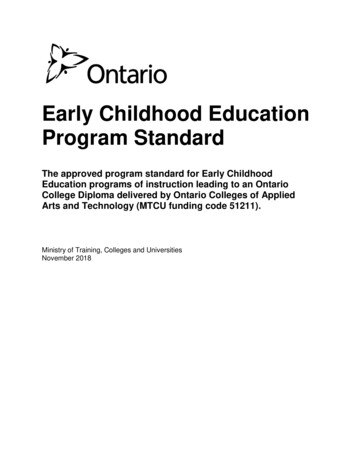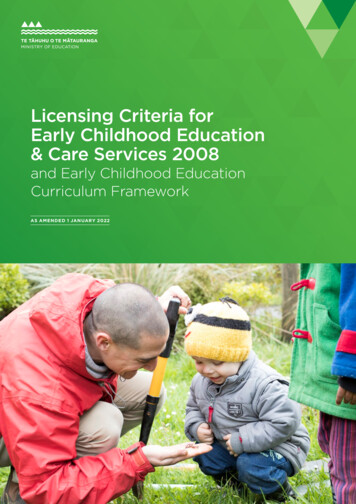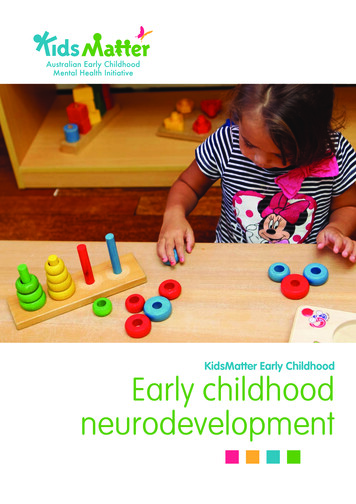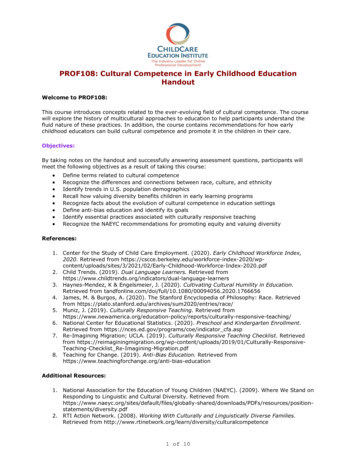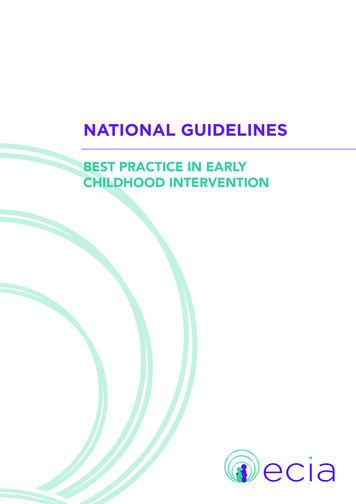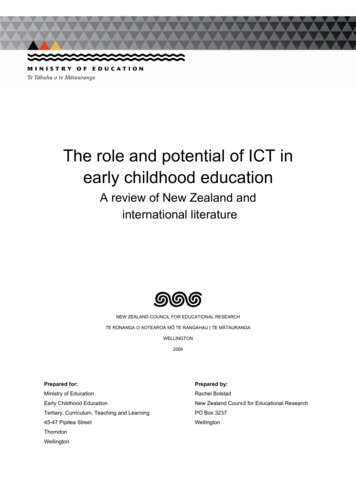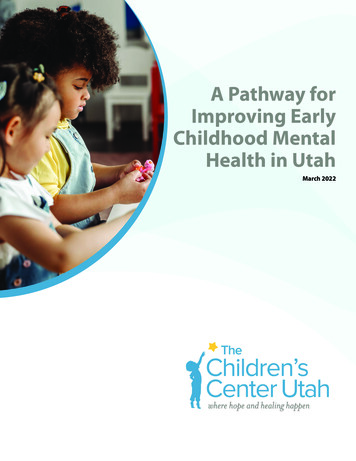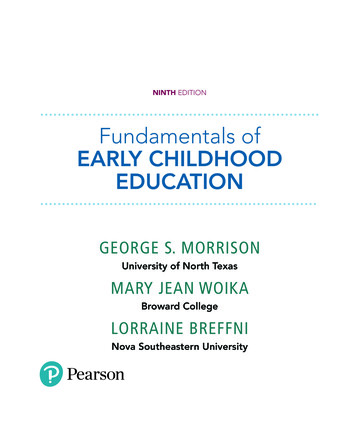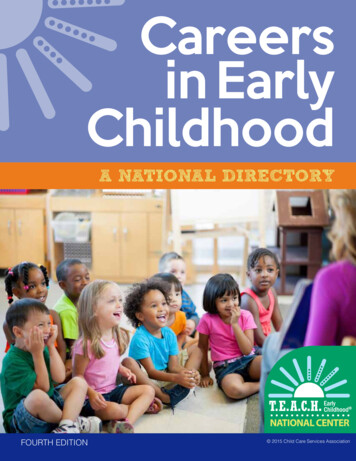
Transcription
Careersin EarlyChildhoodA National DirectoryFourth Edition 2015 Child Care Services Association
Careers in Early ChildhoodA National DirectoryFourth EditionTable of ContentsTable of Contents. iCareers in Early Childhood. 1Glossary. 2Teachers of Young Children: Child Care, Head Start,and Pre-K-Based Programs. 3Providers of Home-Based Services. 4Administrators/Directors of Center-Based Programs. 5Professional Development Coordinators. 6Instructors and Trainers. 6Technical Assistance Specialists. 7Regulators. 7Topic Specialists. 8Program Managers. 9Family Specialists/Counselors. 10Consultants. 11Researchers. 11Sales Representatives . 12Early Childhood Program Officers. 12Financial Aid Sources. 13References. 14This document was produced by the T .E .A .C .H . Early Childhood National Center andChild Care Services Association (CCSA). Through direct services, research and advocacy,CCSA works to promote high-quality early care and education. T .E .A .C .H . Early Childhood Projects award educational scholarships to the early childhood workforce in 24 states and theDistrict of Columbia. The Child Care WAGE Project provides salary supplements to earlyeducators in five states. To learn more, please visit the T .E .A .C .H. Early Childhood NationalCenter’s website at www.teachearlychildhoodnationalcenter.org.This Directory was funded in part by The W.K. Kellogg Foundation and the W. Clement& Jessie V. Stone Foundation. We thank them for their support but acknowledge that thefindings and conclusions presented in this Directory are those of the authors alone anddo not necessarily reflect the opinions of these organizations.PO Box 901, Chapel Hill, NC 27514919-967-3272 – telephone919-442-1988 – facsimilewww.teachearlychildhoodnationalcenter.org 2015 Child Care Services Associationi
Careers in Early ChildhoodThis directory was created to introduce you to the variety of careers in the early childhood field. As largernumbers of child ren live in families where all parents work, more early childhood professionals are neededto educate and care for these children. Families also need people to help them find the right early care andeducation program and assistance paying for it. In addition, our society has become more concerned abouthow this experience affects young children and what quality early care and education really means. Theseconcerns have led to an increase in resources to support improving the quality of programs for young childrenand have simultaneously increased employment opportunities. Today, we need more researchers to find outwhat produces quality child care programs; we need more professional development specialists and technicalassistance consultants to help early childhood programs and partners use the information researchers havefound; we need more facility regulators to make sure child care, Head Start and Pre-K programs are meetingthe requirements for quality; and we need more administrators to help the workforce meet the needs ofincreasingly diverse children and families.A sampling of different types of employment opportunities in the early childhood field according to the populationserved or supported by each is provided in the first section of this directory. As you read each positiondescription, note that there may be different types of jobs in each category, each with its own specific responsibilities, requirements and salaries. In addition, the increasingly diverse families and workforce mean that thereare greater needs for multi-lingual professionals with some positions reserved exclusively for people with thoseskills.Education opens the door to more career opportunities, increased earnings, and to becoming a certified and/orlicensed early childhood professional. Both associate and bachelor’s degree programs offer an array of educationalopportunities on campus, online and in local communities. A list of loan and scholarship options follows inthe latter part of the directory to help you find resources to pay for your education. It is suggested that readersdetermine if a program is regionally accredited prior to enrollment. For a list of regionally accredited college anduniversity programs, go to: www.chea.org/Directories/regional.asp. Readers are also encouraged to contact oneor more of the following persons to seek guidance on applying for financial aid: a high school guidance counselor,the college’s financial aid office, student advisement center and/or early childhood department chair/coordinator.If you are seeking training opportunities, readers are encouraged to contact local resources for non-credit bearingopportunities including the local, regional or statewide child care resource and referral agency, the state agencythat regulates child care facilities, nonprofit agencies that oversee funding for child care quality, and businessgroups such as a small business center and SCORE (Service Corps of Retired Executives, www.score.org).A recent report form the Institute of Medicine (IOM)/National Research Council, Transforming the Workforcefor Children Birth Through Age 8: A Unifying Foundation, validates the importance of the early years in settinga trajectory for success in school, career and life and strategically links what children need with what the earlychildhood workforce should know and be able to do px).Early childhood is a critical time in the lives of children. Careers in early childhood can provide a rewardingopportunity for those who choose to make their life’s work focus on that period of child and family development.There are lots of opportunities in the field of early childhood to move between and among different careers. Thekey to having this mobility is often found in one’s education. A bachelor’s degree in early childhood educationopens the door for almost every career described herein. It is also the minimum education standard for leadteachers recommended in the IOM report. Many in our field begin their careers in the classroom workingdirectly with you children and families, but later move to jobs that use that experience and knowledge to workon behalf of young children. Whether you are a student considering a career in early childhood or an earlychildhood professional considering your career options, we hope that this directory will inspire you with themany available career opportunities.Sue Russell, Executive DirectorT.E.A.C.H. Early Childhood National Center 2015 Child Care Services Association1
GlossaryGlossaryof Selected Early Childhood Work Environments Public Pre-kindergarten (Pre-K) Programs serve children ages 3 to 5 years, may be targetedto specific children and may be offered to families in a public school, nonprofit and/or for-profit private facility.Some of these programs operate for half of the day while others follow regular school hours. In addition,some programs may provide wrap-around services to care for children after school. Funds for public Pre-Kprograms come from local, state or federal governments, and parents may pay no fee or a fee adjusted totheir income. Child Care Centers provide care and education for child ren ages birth to five, and may include beforeand after-school care and summer care for preschool or school-age children. Centers vary by size, agesof children served and mission. Most centers operate for more than four hours per day. Centers may beoperated by nonprofit agencies, for-profit owners or corporations, or government agencies. Funding primarilycomes from parent fees with some parents able to receive government assistance. Family Child Care Homes serve small numbers of children and are usually licensed or registered bya public agency that is responsible for overseeing the provision of child care and/or school-age services.Funding comes primarily from parent fees, the subsidized child care system and the Child and Adult CareFood Program. Head Start programs provide developmentally appropriate early learning activities plus health, nutrition,early intervention and family support services. Most Head Start programs serve 3- and 4-year-old childrenfrom low-income families in both center-based and home-based settings. Early Head Start is limited tochildren from birth to three. Head Start centers traditionally operate 4-6 hours a day for nine months of theyear. Some centers provide services all day, year round. Others provide seasonal programs for childrenof migrant families. Head Start programs may be operated by public schools or other nonprofit communityorganizations. In some communities you may find Head Start and/or Early Head Start classrooms withinlicensed child care programs. Funding primarily comes from the federal government and parents pay no fees. Child Care Resource and Referral (CCR&R) Agencies help families find the child care theyneed and educate families and the community about early care and education choices, quality and issues.CCR&R agencies also help child care providers improve quality through training, technical assistance andother supportive services. Many CCR&R agencies also provide financial assistance for families needing helppaying the full fees charged for child care or information on where to find assistance with child care fees. In-Home Care usually is provided to the children of a single family in that family’s own home. Sometimesin-home caregivers live with the family and/or may be related to the family. These caregivers may or may notbe related to the children in care and depending on state law, may be required to be regulated or licensed.Funding for in-home care comes primarily from parent fees. Private Preschool Programsmay be based in a center, place of faithor in the community. They may provideearly education programs that typicallyoffer educational enrichment and socialinteractions for children ages 2 to 5 years.These programs usually operate on apart-day basis, two to five days per week.Funding comes primarily from parent fees. 2015 Child Care Services Association2
Teachers ofYoung Children:Employment OpportunitiesChild Care, Head Start,and Pre-K-Based ProgramsThe job of teaching preschool children in a center-based program can be bothextremely rewarding and challenging. Between birth and the time a child is readyto go to kindergarten, children experience remarkable developmental changes. Thedaily activities of a teacher of infants are very different than those of a teacher offour-year-olds. Teachers may work with typically and atypically developing children.Yet all teachers need certain skills and knowledge to perform their jobs well. Teachingyoung children requires that you have knowledge about and learned skills in:1.2.3.4.how children grow and develop,planning activities for children in a creative learning environment,securing a safe and healthy place for children to play,how to communicate with an increasingly diverse population of childrenand their families,5. effective group management strategies, and6. a commitment to learning how to best educate and care for the young child.Within any center-based setting, teachers may be found in a variety of positions.The beginning teacher may be called an Assistant Teacher or Teacher’s Aide andwork with and under the supervision of a more educated, experienced teacher.Sometimes in larger programs a teacher who has more education and experienceis given the title of Lead or Mentor/Master Teacher. This position may entailmore planning and supervision of other teachers, as well as center administrative responsibility. All individuals who work directly with young children should becertified in CPR and first aid and have a criminal record check, in addition to havingcoursework, credentials or degrees in early childhood education.Job possibilities at: Child care centers Private preschool programs Head Start programs Publicly-funded prekindergarten programsRecommended education Child DevelopmentAssociate (CDA) Credential Associate’s degree inEarly Childhood Education/Child Development Bachelor’s degree inEarly Childhood Education/Child DevelopmentTypical salary range 16,430 – 49,660Teaching young children in center-based programs can vary by auspice orsetting. Most commonly, teachers are found working in child care centers.These centers include those operated by Head Start programs, places offaith, schools, colleges, mental health agencies, nonprofit groups, non-childcare employers/industry, chains/corporations, or for profit providers. Someprograms operate only a few hours a day, a few days a week; others areopen twelve hours or more a day, five days a week. Some operate understate or federal regulations; others operate without any external oversight.The auspice of the program can make a big difference in what is expectedof teachers and what teachers can expect in terms of compensation, careeradvancement, work environment and the quality of early care and educationprovided to the children. In many states these programs can choose to bea part of the state’s Quality Rating System to demonstrate the provision ofhigher quality early care and educationThere is increasing interest in and funding for prekindergarten programsfocused on helping three- and four-year-olds acquire the skills for success inschools. Pre-K programs are found in diverse settings and often have stateor federal funding. Some are targeted to children at risk for school failure.Others are universally available. Teachers in those settings often earnsubstantially more than teachers working in traditional child care centersand must have higher levels of education and/or a teaching license. 2015 Child Care Services Association3
Providers ofHome-Based ServicesProviders of home-based services maywork with young children in a child’shome or in their own home. They maywork with as few as one child or carefor several children at one time. Withinthe home setting, the teacher has theresponsibility of providing a safe andstimulating environment (both indoorsand outdoors) for children, planningdevelopmentally appropriate activities,ensuring that the children are givennutritious meals, communicating withparents about the program and theirchildren, setting and collecting fees,and managing and marketing a smallbusiness.Often the home setting provides a more natural environment for the care of youngchildren that is seen as more friendly and comfortable by parents. Many womenbegin this career because they have a preschool child of their own and wantadditional income for themselves and a social experience for their child. In somestates home-based settings have either no or only minimal regulations to meet,depending on the number of children served and the hours of operation. In others,family child care homes are required to be licensed and may be able to meet higherstandards associated with a state’s Quality Rating System. Many family child carehomes care for children of different ages, extending from infancy through school age.Employment OpportunitiesJob possibilities at: Private homesRecommended education Child DevelopmentAssociate (CDA) Credential Associate’s degree inEarly Childhood Education/Child Development Bachelor’s degree inEarly Childhood Education/Child DevelopmentTypical salary range 11,500 – 35,000Family child care homes receive funding from parentfees, may participate in the Child and Adult CareFood Program to help support adequate nutrition forthe children, and may also receive reimbursementfor families who receive public or private child careassistance. Most in-home caregivers, often callednannies, operate solely on parent fees. Because ofthe limited number of children that can be cared forin a home setting, additional sources of revenue canenhance the teachers’ earning potential. 2015 Child Care Services Association4
Administrators/Directorsof Center-Based ProgramsEarly care and education center administrators/directors have the challenging job ofensuring that center-based programs offer developmentally appropriate experiencesfor the children, are supportive of the needs of families, and operate with soundadministrative and fiscal management. The job of a center administrator oftenrequires both formal education and learned skills. Administrators/directors mustbe able to manage the program and lead the staff in offering stimulating, enrichingand nurturing early learning experiences. In addition, the administrator/directormust have the combined skills of a mentor, social worker, early childhood educator,nutritionist, accountant, human resources manager, secretary, and programadministrator to operate a dynamic education and human service. An advanceddegree in early childhood program administration can provide the variety of trainingnecessary to master this position.A child care administrator/director must ensure that:1. the program maintains all of the required local, state and federal standards;2. the teachers working with the young children are appropriately screened,educated, well-trained, and provide the children developmentally appropriateeducation, care and supervision;3. children are always properly supervised, even when the regular classroomteacher is unable to come to work;4. the nutritional needs of the children are met, even when the cook is sickor parents have forgotten to pack a lunch;5. the center has ample enrollment to sustain the budget;6. tuition or fees are established and collected;Employment OpportunitiesJob possibilities at: Child care centers Private preschool programs Head Start programs Publicly-funded prekindergarten programsRecommended education Associate’s degree inEarly Childhood Educationwith coursework inadministration Bachelor’s degree inEarly Childhood Education/Child Developmentwith coursework inadministration Graduate degree inEarly Childhood ProgramAdministrationTypical salary range 27,110 – 72,2207. available resources to support operating expenses, increase professionaldevelopment levels of staff, provide nutritious meals and subsidize tuitionare continuously sought;8. a healthy, safe and stimulating indoor and outdoor environment is providedand maintained;9. parents are able to become involved with the center and to communicatetheir needs and concerns;10. financial obligations of the center are met, including paying teachers andother staff a worthy wage and benefits; and11. the center is represented in the community through work with othercommunity agencies.If the center is very large, the administrator may have an assistant administrator/director to help meet some or all of these responsibilities. The position of administrator/director and assistant administrator/director can be found in centers operated byHead Start, places of faith, schools, mental health agencies, nonprofit corporations,or for profit providers. Some are part-time programs; others are open twelve hours aday or more. Some operate under state or federal regulations; others operate withoutany outside regulations. Some serve less than a dozen children while others servehundreds in multiple sites. Some programs that operate full-time, year-round mayonly have part-time administrators/directors. These differences help determine whatis expected of administrators/directors and what they can expect to earn. 2015 Child Care Services Association5
Professional DevelopmentCoordinatorsProfessional development coordinators help teachers and programs assess, planand achieve personal professional development goals. They serve as communityleaders and catalysts for professional development opportunities to meet theneeds of the early childhood and school-age workforce. Professional developmentcoordinators use research-derived data to regularly assess the professional needsof the early childhood workforce in the community. They serve as liaisons betweenearly childhood and school-age educators and existing educational systems.They ensure that professional development activities are available, accessible,high quality and relevant to subjects or content areas that reflect research-basedand appropriate early childhood and/or school-age practices. T.E.A.C.H. EarlyChildhood and Child Care WAGE coordinators and counselors routinely providecareer and professional development counseling to the early childhood workforce.Professional development coordinators must possess good written and oralcommunication skills; be able to collaborate, plan and partner with other agenciesand institutions providing professional development opportunities; be able toprovide professional development opportunities on a wide variety of topics; knowhow to provide follow-up support; and document and evaluate services provided.Professional development coordinators also advocate for policies, standards,practices and efforts necessary for ensuring and retaining a well-educated,compensated, and skilled early childhood workforce. A number of states arebeginning to require certification or approval of those who provide training to earlycare and education program staff.Employment OpportunitiesJob possibilities at: Colleges Universities High schools Child care resource andreferral agencies Professional associations Public and nonprofitagencies Self-employmentRecommended education Bachelor’s or graduatedegree in EarlyChildhood Education/Child Development orYouth DevelopmentTypical salary range 26,450 – 108,640Instructors and TrainersThose who teach the personnel working in settings with young children have the important responsibility of giving thefield the necessary knowledge and skills to be effective. Whether working as a faculty member in a college, as a trainerin a CCR&R agency, or as an independent training consultant, these adult educators must have an understanding ofadult learning and effective teaching strategies, as well as special knowledge about the subjects they are teaching. Priorexperience working with young children and families is often helpful. Instructors and trainers provide important informationto potential and practicing early childhood professionals, parents and the public on a variety of topics such as childdevelopment, early literacy, facility regulatory requirements, developmentally appropriate and effective practices, behaviormanagement strategies, diversity in all its forms (ability, cultural, linguistic and ethnic), program administration, workingwith parents, inclusion of all children, and local, state and national early childhood policy issues and current research.Both formal education and training may be provided in high schools, individual child care programs, at workshops orconferences, and through courses offered at colleges and universities. A number of states are beginning to requirecertification or approval of those who provide training to early care and education program staff. 2015 Child Care Services Association6
Technical AssistanceSpecialistsTechnical assistance (TA) is defined as consultationprovided either on the phone, by email, or on-site thatoccurs in response to a staff question, an observationoccurring during an on-site visit, or as part of a qualityimprovement activity*.TA specialists provide assistance for an individualclassroom, multiple classrooms and/or an entireprogram to start-up, address corrective actionrequirements, and/or achieve higher quality. Specialistsof TA work with programs for varying lengths of timeto share and support the implementation of researchbased and developmentally appropriate teachingstrategies and practices. Specialists may also workwith program administrators to strengthen business knowledge and skills and workwith community stakeholders to reach common goals.Employment OpportunitiesJob possibilities at: Child care resource andreferral agencies Professional associations Public and non-profitagenciesRecommended education Graduate degree inEarly Childhood Education/Child DevelopmentTypical salary range 40,000 – 60,000TA specialists must possess good oral and written communication skills and have adeep level of knowledge about facility licensing, early childhood education classroomand program assessment tools, and community resources available to address identified needs.Providing on-site TA and support is an interesting, exciting and rewarding job. It can also be physically tiring and emotionallydraining. Not everyone is well suited to be a TA specialist. Persons who characterize themselves as self-directed andorganized, energetic, and willing to learn will be the most likely to succeed in this role. A number of states are beginning torequire approval or certification of those who provide technical assistance to early care and education program staff.* Opening the Door to Quality. The National Child Care Resource & Referral Association. Washington, DC. 2005.RegulatorsRegulators have the job of ensuring that early childhood programs of all kindscomply with the appropriate federal, state or local requirements. The job of aregulator involves visiting programs to assess their compliance with applicablestandards. Often regulators provide technical assistance and training to program staffto help them meet the necessary requirements. In some cases, regulators must alsoinvestigate early childhood programs that have been reported for noncompliance.All regulators of early childhood programs must possess an understanding of howchildren develop, how to plan and implement appropriate early childhood activityplans, how to develop an operating budget, where to seek resources to supportfamilies, children and program needs, effective group management skills, and basichealth and safety practices. Regulators must also know the specific rules that aremandated in their specific regulatory arena. Finally, regulators must possess goodcommunication and interpersonal skills to work with the people they are charged withmonitoring. This job requires expertise at balancing the need to protect the welfareof children with the need to reassure teachers and administrators/coordinators whoare trying to provide quality early experiencesfor children and families.Job possibilities at: Child and Adult Care FoodProgram (CACFP) Child care licensing State prekindergarten offices County/state departments ofsocial services or education Office of Head StartRecommended education Graduate degree in EarlyChildhood Education/ChildDevelopment/Social WorkTypical salary range 34,000 – 62,500Most regulators work for federal, state or localgovernment entities. Early childhood regulatorsworking at the state level are typically assigned territories or regions, which meansthat their jobs may require substantial travel. A child care program consultant may workfor a public agency and monitor licensed or regulated programs. Other state agenciesalso employ consultants to focus on a particular area or need. For example, a programconsultant working within a health department may monitor programs that servechildren with diverse abilities. At the local level a social worker may be assigned toinvestigate abuse or neglect referrals within child care programs. 2015 Child Care Services Association7
Topic SpecialistsTopic specialists provide resources, training, and technical assistance to teachersand programs to support the us
CarEErs in Early Childhood This directory was created to introduce you to the variety of careers in the early childhood field. As larger numbers of children live in families where all parents work, more early childhood professionals are needed to educate and care for these children. Families also need people to help them find the right early .
